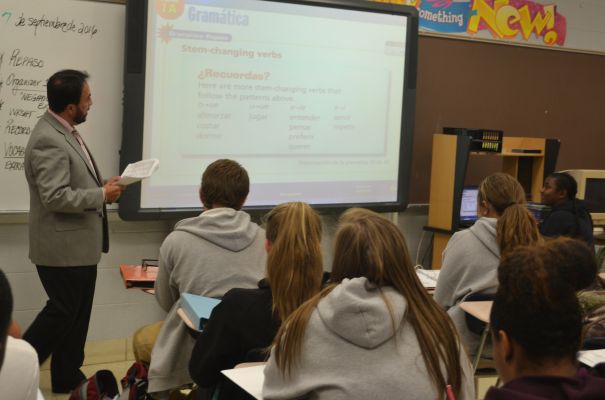Editorial: Teacher Effectiveness Statistics Should Factor Real Situations of Students
MANY HAMILTON COUNTY TEACHERS ARE CONSIDERED INEFFECTIVE — Jose Sanchez teaches his Spanish II class the important of foreign language.
September 9, 2016
On the first day of school, students are eager to see if they have classes with their friends, and teachers are investigating to find out which students in their classes will be studious and which will be the troublemakers.
Jump in time to the fourth quarter of the year, and teachers are worried that they will not have enough time to teacher all of the required standards, and students are nervous about taking finals. This is what typically goes on for every student and teacher throughout education. As the students advance to a higher grade level, the stress and challenges intensify.
One thing school districts all across the country love to do is evaluate their educators. Though, is this still a good idea to evaluate educators based on test scores or the ten minutes an administrator has to observe a classroom?
“Teachers are effective based on experience. A big thing about teaching is loving what you do,” explained psychology and sociology teacher Tina Staton.
A recent Chattanooga Times Free Press article, based on the 2014-2015 school year, found that nearly 1/3 of teachers in Hamilton County are considered, “least effective.” This statistic is nearly double the three other major education systems in Tennessee, and almost triple the state average, which stands at only 11.4%. Nevertheless, the findings highlight that a majority of economically-disadvantaged schools have more least effective teachers than others.
Should a teacher be considered ineffective when their students preform poorly on a standardized test? Many students at economically-disadvantaged schools have other variables that could effect their learning. For example, some may be concerned of where their next meal will come from, while others may be scared due to the recent violent crime in their area. This past summer, one man was shot and another injured on Cannon Avenue in downtown Chattanooga. Not five minutes away from these crimes sits Clifton Hills Elementary School. According to the Hamilton County Department of Education, approximately 80 percent, the highest rate in the county, of the educators at Clifton Hills are considered least effective.
Additionally, in 2012, a school bus route was changed for Donaldson Environmental Science Academy and Orchard Knob Middle School, for there was fear of gang activity in the area. Hamilton County claims that Orchard Knob Middle has a teacher ineffectiveness rate of nearly 66 percent.
“It does not seem it should be all the teacher’s fault for low test scores or teacher observation ratings,” stated Central junior John Britt.
Everyone can simply be having a bad day, whether that be the day of the test for students, or the day of an observation for teachers. Many teachers spend hours of unpaid time grading papers, preparing lesson plans, or making sure their classroom is ready for the next day.
Teachers, students, and administrators all have one things in common: they are all human. Most educators chose to become educators for the life experience and joy of student interaction, not for the paycheck. How poor of a moral boost it is for teachers to hear that one-third of their colleagues are considered to be ineffective at their job? Everyone can have a bad day, and one’s entire career should not be classified based on student test scores or a short observation by administrators.
To all the teachers out there, keep doing what you are doing, some students still appreciate your hard work. On those hard days when you question whether your time and effort is worth it, just remember the smiling faces of your students when they walk into your classroom.





